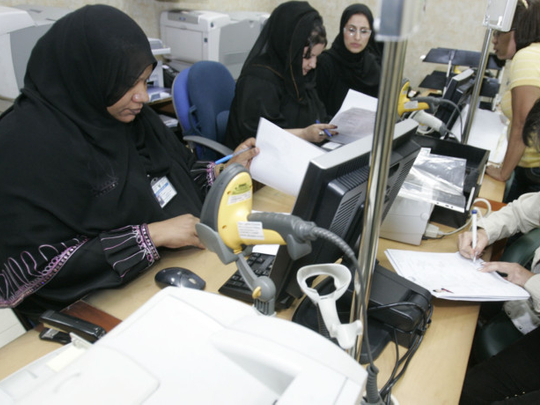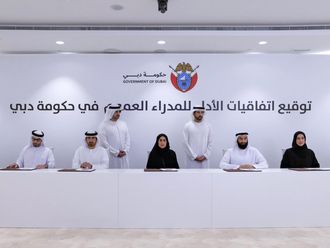
Abu Dhabi: The Cabinet has passed a new draft law to ensure that men and women receive equal pay for equal work, it was announced on Tuesday.
The pioneering bill comes as part of the National Strategy for Empowerment of Emirati Women in the UAE for 2015-2021, launched by Her Highness Shaikha Fatima Bint Mubarak, Chairwoman of the General Women’s Union, Supreme Chairwoman of the Family Development Foundation and President of the Supreme Council for Motherhood and Childhood, to position the UAE among the most advanced countries in women’s empowerment.
The new bill requires approval of the Federal National Council and President His Highness Shaikh Khalifa Bin Zayed Al Nahyan has to sign the same into law.
His Highness Shaikh Mohammad Bin Rashid Al Maktoum, Vice-President and Prime Minister of the UAE and Ruler of Dubai, said that since the founding of the UAE, Shaikh Zayed Bin Sultan Al Nahyan, the founding father of the UAE, has recognised the importance of establishing gender equality and its long-term positive social and economic effects.
Shaikh Mohammad added the UAE has been a pioneer in women’s participation in the development process since the foundation of the union. “The Equal Pay Law is complementary to this process. We look forward to a bright future for the country,” Shaikh Mohammad added.
Shaikh Mohammad took to Twitter on Tuesday to announce that there would be no more discrimination among genders when it comes to wages.
“With the force of the law and wisdom, there are no exceptions in providing equal opportunities between the sexes. Our Constitution includes the equal rights and duties of genders, and we seek to enhance, enforce and guarantee this constitutional right through the new law,” Shaikh Mohammad said on his twitter account.
Iceland ranks first on the World Economic Forum’s 2015 global gender gap index, followed by fellow Nordic nations Norway, Finland and Sweden.
The UAE aims to be among the world’s top nations in women’s empowerment and gender equality, officials and academicians said.
“Women’s empowerment and gender equality is a key target in the UAE’s national strategy, aimed to be achieved by 2021,” Sarah Al Amiri, Minister of State for Advanced Sciences, told Gulf News.
“It’s about time that the UAE, which is at the forefront of women’s empowerment, enshrines equal pay for women and men in law. We have been getting equal pay and it is the right time to have this enshrined in the UAE laws,” Al Amiri said.
The minister said the UAE has achieved tremendous gains for women and encouraged women to break boundaries.
Women represent more than 65 per cent of the Emirati workforce in the federal government
Azza Sulaiman Bin Sulaiman, a member of the Federal National Council from Dubai, said the UAE is a model for women’s empowerment regionally and internationally.
In 2015, the UAE Council for Gender Balance was established to position the country among the leading countries in the world in terms of gender balance.
Bin Sulaiman said the visionary leadership that fully supports women believes that for a society to be productive, it has to make use of the talents and capabilities of both men and women.
She added despite the UAE being a young country, it has seen huge positive changes sweeping over its society since its beginning. “I am honoured to be a member of the UAE’s parliament led by a woman speaker and today our beloved country is ranked second in the world to have an equal gender pay law.
“The UAE’s record in women empowerment and gender equality is quite striking and that the country offers a positive home-grown model for women’s development and empowerment for the entire world,” Bin Sulaiman said.
Dr Mona Al Bahar, professor at the UAE University, said how women’s development and gender equality are only one of the UAE’s progressive policies which emphasise harmony and tolerance, making the UAE a place of hope and opportunity for the rest of the region.
“The new equal gender pay law is yet another achievement. Although rights of both men and women are equal, this legislation provides a legal framework to guarantee and protect these rights,” Al Bahar said.
Gender equality in UAE
Women make up 66 per cent of public sector workers, and 30 per cent of them are in leadership roles.
Women aged 15 years and above constitute 46.6 per cent of UAE’s labour force.
Women occupy about 75 per cent of positions in education and health sectors.
The UAE has eight women ministers, making it one of the highest rates of ministerial representation in the region.
Women representation in the Federal National Council stands at more than 22 per cent.
95 per cent of female high school graduates pursue higher education.
The UAE ranked first in the 2015 World Economic Forum report on the literacy rate indicator and on women’s enrolment in secondary education index.
The UAE ranks first among 132 countries in the ‘women treated with respect’ indicator in the Social Progress Index 2015 report.
The number of Emirati women in the diplomatic and consular corps at the Ministry of Foreign Affairs and International Cooperation’s headquarters is 175. Additionally, 42 women work in the diplomatic corps at the UAE missions abroad. There are currently four women ambassadors in the diplomatic corps at the Ministry of Foreign Affairs and International Cooperation.
UN Convention
The UAE signed the UN Convention on the Elimination of All Forms of Discrimination against Women (CEDAW) in 2004. The convention is described as an international bill of rights for women and recommends that member countries to establish a monitoring mechanism to ensure the enforcement of legislation requiring employers to provide equal pay for work of equal value.












